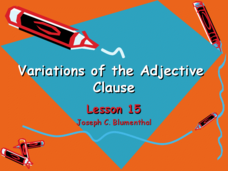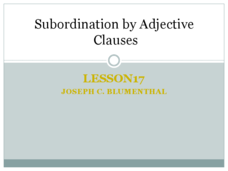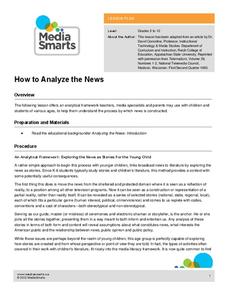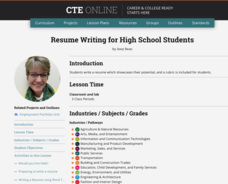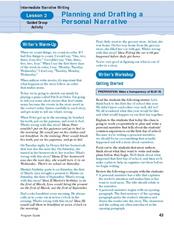Curated OER
Variations of the Adjective Clause: Lesson 15
Help your students to vary their sentence structure with this presenation, which teaches them to use relative pronouns and adjective clauses to change the order of their sentences. The presentation details different ways to write the...
Curated OER
Subordination by Adjective Clauses
A must-see for teachers who are tired of reading essays full of simple sentences, this thorough and engaging presentation teaches students to subordinate independent clauses by turning them into adjective clauses. Don't be discouraged by...
Curated OER
My Blackberry Isn't Working
This worksheet starts out on a strong note by using a humorous video called "My Blackberry Is Not Working" from BBC One to teach parody. While they watch the short video, viewers fill out a chart about the electronic brands, noting any...
Curated OER
Worksheet 7: Print Advertising
Use this versatile, cross-curricular graphic organizer to demonstrate the power of words in advertising. Scholars analyze print advertisements, identifying parts of the ad that stand out. This could include color, celebrity endorsement,...
Curated OER
Adding -ing to Words
If you are teaching your young writers about the rules involved when adding -ing to the end of a word, then this presentation is for you! Learners are shown the two most important rules when adding -ing to the end of a word, then...
Curated OER
School, Unplugged
What would school be like if you couldn't teach lessons that require technology? Would it benefit the class? Would it hold them back? Have your learners read this article and answer the basic reading comprehension questions. Then have...
K12 Reader
Adjectives Can Change Articles
Is it a interesting book or an interesting book? Teach your class when to use a or an when adjectives are involved. Learners write the article for 32 different adjective and noun pairs.
K12 Reader
Simplify with Pronouns Worksheet Two
Use nursery rhymes to help teach pronouns. Learners read the familiar sentences and replace the repeated words with the proper pronouns. Prior knowledge of these phrases helps to scaffold the exercise.
K12 Reader
Using Prior Knowledge
Sometimes it's hard to relate to a new text. Teach kids to use their prior knowledge when reading something new with a comprehension exercise. A short passage tells them how to think of their brains like filing systems, and provides five...
K12 Reader
Estimation
Teach your class a thing or two about making educated mathematical guesses. Learners read a passage that explains estimation and approximate and exact answers. They then respond to five questions about and related to the text.
K12 Reader
They See with Their Ears
Sometimes bats get a bad rap, even though they are fascinating creatures! Teach your class about echolocation with a reading passage. After reading, class members respond to five questions based on the text.
K12 Reader
Magnetic Attraction
Teach your class about magnets and electromagnets with a reading passage. After reading the passage, learners respond to five related questions.
K12 Reader
Basic Geometry Terms
Set your pupils up to start on geometry by teaching them some introductory terminology. Pupils learn the terms by reading a short passage and looking at examples. They then respond to five questions related to the text.
K12 Reader
The Art of M.C. Escher
Show your class one way in which art and math are related by teaching them about M.C. Escher. Class members read a brief passage and then respond to five related questions.
Media Smarts
How to Analyze the News
Teach kids how to watch television, specifically the news, with this creative idea for learners of all ages from the Media Awareness Network. The elementary school plan focuses on presenting news as a story and uses Jon Scieszka's story...
Media Smarts
Marketing to Teens: Talking Back
Teach your class to talk back in a constructive and respectful way. This focuses in particular on talking back to the media and to advertisers when they have concerns. Learners participate in a brainstorm and then compose letters or...
Curated OER
Who Knows? Your Privacy in the Information Age
Teach young adults how to become advocates for their privacy in the modern information age. In a series of five lessons, learners explore their beliefs and opinions about privacy vs. the actual laws regarding who has the right to access...
Power Show
Out of the Dust
Is your class reading Out of the Dust? If they are, or if this is your first time teaching Karen Hesse's Newbery Medal winning novel, check out the ideas in a presentation that outlines what you and your class can do while reading about...
California Department of Education
Resume Writing for High School Students
Looking to teach your high schoolers how to write a resume? A strong plan for doing so is detailed here. Class members examine a poorly written example and then create their own original resumes using an organizer and Word template. Once...
Curated OER
Peer Editing Worksheets
What kind of writing did your class just complete? Narrative writing? Process writing? Compare and contrast writing? Print this packet; there are 10 different peer-editing worksheets included here for a variety of writing. Teach your...
Curated OER
Picturing Prepositions
An interesting take on teaching prepositions! Instead of using basic sentences, this worksheet provides pictures, and the pupil must describe the picture using a preposition. This sort of activity would also make an excellent...
Curated OER
Holocaust Studies: Five Poems by Dan Pagis
Teaching a unit on the Holocaust? Consider using the personal statements of Dan Pagis’s poetry to contrast with the more “distanced” historical accounts found in textbooks. Five poems, discussion questions, and background notes are...
August House
The Little Red Hen
The Little Red Hen is a wonderful story to teach youngsters about the value of teamwork and sharing responsibilities. As you read through the story, ask comprehension questions to check for and enhance understanding in your class. Kids...
Curated OER
Planning and Drafting a Personal Narrative
Bring your learners together to write a class narrative about the first day of school. Start off by teaching them about sequence with a quick oral activity. Then, work together to fill out a story map. Finally, compose the class...


